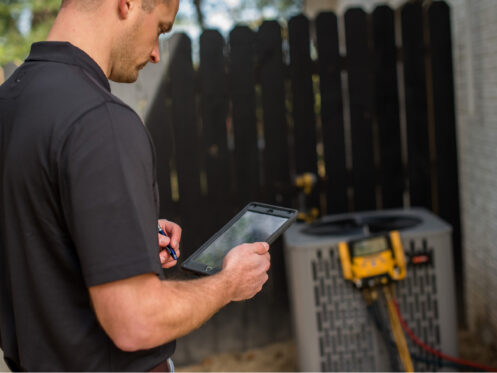Heating and cooling account for about 45% of residential energy usage in the U.S. That number is only going up, and it already represents 20% of U.S. greenhouse gas (GHG) emissions. This isn’t just an American problem. Worldwide air conditioner usage produces more greenhouse gases than the entire aviation industry combined.
Many scientists believe AC will be the leading cause of GHG as early as 2030. The impact of each individual household is real, and there are steps that you can take now. This will not only lower your household’s carbon footprint but also reduce your heating and cooling costs significantly.
Air Conditioners and Heat Pumps
Most homes in the U.S. have either a central AC or heat pump. A heat pump is an AC with a reversing valve that allows it to provide heat as well as cooling. There are a series of rating systems that the Department of Energy (DOE) uses to assess the energy consumption of these systems.
Energy Ratings
Seasonal energy efficiency ratio (SEER) measures the efficiency of cooling over an entire season. The Air-Conditioning, Heating and Refrigeration Institute (AHRI) developed and maintains this rating. The DOE regulates it. Using this value, you can compare one AC or heat pump to another and determine which will conserve more energy. The higher the value, the better.
The energy efficiency ratio (EER) is similar in that it measures cooling efficiency. That said, it does so without considering the context of the entire cooling season. It’s useful in certain comparisons but less useful to consumers in general.
Heating seasonal performance factor (HSPF) is a rating that the AHRI and DOE use exclusively for heat pumps. It measures heating efficiency over an entire heating season. As with SEER, the higher, the better.
There are also SEER2 and HSPF2 ratings. We’ll discuss those further in the section on ducts.
Seasonal Maintenance and Energy Consumption
The industry recommends annual maintenance for your AC. If you have a heat pump, you should schedule a cooling tune-up in the spring and a heating tune-up in the fall. There are many good reasons to do this, but we’ll focus specifically on energy conservation here.
All ACs and heat pumps have a condenser coil and an evaporator coil. These are two crucial elements in the refrigeration process. They both accumulate a buildup over time. This accumulation makes the coils less efficient. They consume more energy when dirty, and your cooling or heating costs will go up. There’s also the matter of ensuring there are no refrigerant leaks, maintaining the condenser pump, and so forth.
Seasonal maintenance can save you money. The DOE estimates that an unmaintained AC or heat pump will eventually use 30% more energy than when it is new. With a tune-up, you can generally cut your monthly costs by at least 10% and perhaps as much as 20%.
Gas and Electric Furnaces and Boilers
When it comes to heating, heat pumps generally conserve more energy overall than furnaces and boilers. They’re just that much more efficient in how much energy they use to get the heat you need. Still, having just an air-source heat pump (ASHP) isn’t practical in many regions. This is why it has become common to pair an ASHP with a furnace for auxiliary heating.
When comparing gas furnaces and boilers to electric furnaces and boilers, the gas models conserve more energy. There are a couple of problems on that front. One is that natural gas is not always available, and propane and heating oil can be expensive. The other issue is that natural gas is not an infinite resource. The U.S. could run out of natural gas as early as 2100. Experts expect a U.S. ban on gas furnaces and boilers well before that point.
AFUE
The American Society of Heating, Refrigerating and Air-Conditioning Engineers (ASHRAE) developed and maintains the annual fuel utilization efficiency (AFUE) rating. The DOE regulates it. AFUE measures how efficient an appliance is at converting fuel into heat. If a furnace has a 90% AFUE rating, that means that it wastes 10% of the fuel it consumes.
This value is less useful when it comes to electric heating. An electric furnace has a 100% AFUE. It’s more efficient in a sense, but the consumption of energy when using electricity is greater overall.
You can use AFUE to compare one fuel-burning heating system to another. The minimum AFUE for furnaces and boilers in the U.S. is 80%. The DOE will increase that minimum to 95% starting in 2028. Consumers can already purchase high-efficiency gas heating systems that have 90% AFUE or higher.
Seasonal Maintenance and Energy Consumption
Seasonal maintenance matters with furnaces and boilers as well. Buildup on heating elements, burners, and pilot light mechanisms will make a unit less efficient. In the case of boilers, you must flush them annually, as sediment accumulation reduces efficiency. The DOE estimates that seasonal heating maintenance will reduce heating costs for the average home by between 5% and 15%.
Ductwork in Central HVAC Systems
Static air pressure is an important concept in duct systems. If pressure is too high or too low, the system will consume more energy. The AHRI and DOE introduced SEER2 and HSPF2 as revisions of their core ratings to account for static air pressure. SEER and HSPF will eventually become deprecated. In the meantime, know that you cannot compare SEER and HSPF to SEER2 and HSPF2, respectively.
The DOE estimates that the average home wastes 30% of its heating and cooling energy through its ducts. You can lower that to about 5%. To do that, schedule an annual duct inspection. Replace the insulation and reseal ducts as needed.
Energy Star, Tax Credits, and Energy Rebates
The EPA uses SEER, HSPF, and AFUE ratings to determine eligibility for Energy Star certification. Energy Star HVAC equipment will consume much less energy than standard HVAC equipment. Choosing Energy Star products may also allow you to claim a federal tax credit and local energy rebates.
Programmable and Smart Thermostats
The average household wastes considerable energy through HVAC when sleeping and away at work and school. The DOE estimates that practically every home can reduce energy consumption by 10% with a programable or smart thermostat. Many households can increase their savings much more than that.
Building Envelope
A home can lose significant heating and cooling due to a compromised building envelope. Consider scheduling a home energy audit every several years. Through an audit, you’ll identify where your home is losing that energy. Some of the likely culprits include:
- Siding
- Roofing
- Insulation
- Foundation
- Natural ventilation
- Windows and doors
Your Local Energy Efficiency Experts in Metuchen
If you live in Metuchen or Central New Jersey, Sam's Air Control is here to help. Our team can improve both the energy efficiency and eco-friendliness of your HVAC system. Our HVAC technicians specialize in gas and electric furnaces and boilers, air-source and geothermal heat pumps, air conditioners, and ductless mini-splits. We also specialize in whole-house fans, air purifiers, UV lamps, dehumidifiers, and humidifiers. Ask us about our maintenance plan!
Call us today to learn more about these products and services or to schedule an appointment in the Metuchen area.


